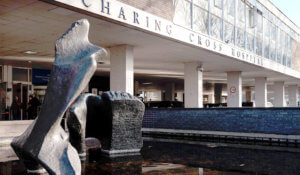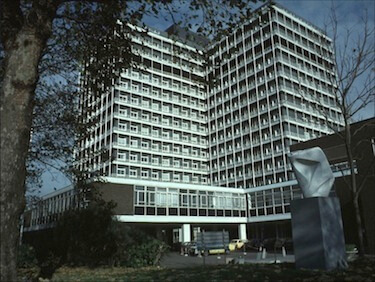Why and How the Ectopic Pregnancy Foundation was Formed
Mr L M Irvine, Chief Executive, explains the background to the Ectopic Pregnancy Foundation.

My first experience of an ectopic pregnancy
I trained at Charing Cross Hospital and qualified in 1981. I had an unusual surgical house job with a combination of breast surgery and gynaecology. Within weeks of starting work in August 1981, I was called to the casualty department to assess a woman. She had been well but had been seen with the possibility of an ectopic pregnancy. She had been monitored and her blood pressure had fallen, her pulse rate had risen and she became semi-conscious. I made the diagnosis of a ruptured ectopic pregnancy and she was taken to theatre, where she underwent an emergency laparotomy and partial salpingectomy. At operation she had approximately 1 litre of fresh blood in her abdomen. She subsequently made an uneventful postoperative recovery and discharged home well. This case had a lasting impression on me as she had been well and suddenly become acutely unwell, requiring major surgery.
My second case
The second case of ectopic pregnancy I saw was later in the same year, when I performed a partial salpingectomy. This was the first major surgical procedure I undertook as first surgeon, with direct supervision from the Senior Registrar. My impression of this case was that the surgery was relatively straightforward; however the difficulty was in making the diagnosis of a potentially serious condition.
I maintained an interest in ectopic pregnancy and read round the subject. Although there appeared to be a number or risk factors for ectopic pregnancy, such as pelvic infection (PID, pelvic inflammatory disease, pelvic sepsis and salpingitis), the association was not strong and the main problem was with considering the diagnosis. After the end of house jobs in 1982, I decided on a career in obstetrics and gynaecology. As Senior House Officer and registrar in London I maintained an interest in ectopic pregnancy; though I did not see many cases in this part of my career.

Research into the incidence of ectopic pregnancy
In January 1990 I was appointed as Registrar at St Bartholomew’s/Homerton Hospital rotation. I was surprised at the number of cases of ectopic pregnancy here: I had seen three ectopic pregnancies in the course of a week and another registrar had a further case. This was much higher than the average rate of ectopic pregnancy, which, in the United Kingdom, is considered to be one ectopic pregnancy in 360 deliveries on the labour ward. I undertook research into the incidence of ectopic pregnancy at the Homerton Hospital, and wrote a paper reporting that the Homerton Hospital had one of the highest rates of ectopics in the whole world. This paper was published in 1993.
The Ectopic Pregnancy Foundation’s early days
I first had the idea of the Ectopic Pregnancy Foundation in 1991, with the aims of the foundation to provide information to patients on the risk of ectopic pregnancy and also to undertake research. In the early 1990s the internet was in its infancy and it was difficult to provide information to patients. I did, however, undertake a number of studies and published in peer review journals on ectopic pregnancy.
Confusion over Ectopic Pregnancy Rates
When I was appointed Consultant in Obstetrics and Gynaecology at Watford General Hospital in April 1995, I continued with my interest in ectopic pregnancy, writing a number of case reports and publications. One of the main problems with ectopic pregnancy is that although the definitive diagnosis is agreed in terms of histological confirmation of ectopic pregnancy, there are no agreed ways of expressing ectopic pregnancy rates.
Even with the same number of cases of ectopic pregnancy being seen in a year in a hospital, with the use of different denominators it is possible for the rates to be quoted as increasing, decreasing or no change. This makes comparison difficult, and complicates the process of assessing the resources required at a hospital.
After reviewing a number of publications on ectopic pregnancy, I looked at the pros and cons of describing rates in terms of the four ways commonly quoted. I subsequently wrote a paper suggesting that the best way of expressing ectopic pregnancy rates was in terms of all viable pregnancy, that is ectopic pregnancies divided by terminations of pregnancy and deliveries on the labour ward. Over many years this data is collected centrally by the government, and is relatively easy to assess.
I have also run courses since 2000 on training of gynaecologists in laparoscopic surgery for ectopic surgery.
The Ectopic Pregnancy Foundation of today is formed
Although established in 2004, I decided to re-vamp the Ectopic Pregnancy Foundation and applied for charitable status. This proved to be a lengthy process, though eventually successful. A board of Trustees was appointed and with the help and advice from information technology experts, established a website www.ectopicpregnancy.co.uk.
The structure of the Ectopic Pregnancy Foundation is that of just three trustees, including myself. This means that all can attend the trustees’ meetings, which is a condition of a registered medical charity. The following were appointed:
Trustees
The Faculty consist of individuals who had an interest in ectopic pregnancy or those who have skills which are used to run the charity and are involved in further development of the foundation.
Medical professionals include, consultants, Mr Patrick Bose and Professor Kim Hinshaw. Junior Medical Doctors like Miss K Nash and Mr R Joseph have been involved in maintenance of the website.
All members of the Ectopic pregnancy Foundation are Honorary and receive no payment for their time.
Funding is obtained by fund raising activities from the general public and medical supply companies. At present we have no central funding.
Peter Adrian Mason, appointed for his organisational skills, ideas, and his track record of running a successful multi-national company (Healix International).
Mr Malcolm L Padwick – Secretary – who has a major interest in laparoscopic surgery and in treatment of ectopic pregnancy. He is a preceptor in laparoscopic surgery and has many years of clinical experience.
It is important that trustees work together as part of a team, and I knew that we all get on well. All the trustees are honorary and have no financial reward
Faculty
Apart from the board of trustees there is also a faculty, comprising individuals who have knowledge in different areas of ectopic pregnancy. They include the following:
International Resident Advisors
Although the Ectopic Pregnancy Foundation is England based, it is envisaged that it will be viewed around the world.
In different countries, there are different systems of health care provision and assess to diagnostic tests and surgery for ectopic pregnancy. As this is the case, we will establish a network of international resident advisors. These international resident advisors will be consultants in obstetrics and gynaecology with a proven interest in ectopic pregnancy. These advisors will have practised in the NHS sector (or their equivalent), not just with private patients. All international resident advisors are honorary and receive no financial reward for their position.
The Ectopic Pregnancy Foundation has a strong association with Charing Cross Hospital – I trained and graduated at Charing Cross, and undertook a number of surgical procedures for ectopic pregnancy as first surgeon under direct supervision there, and also was involved with a number of cases of ectopic pregnancy. Dr Peter Mason, Mr Simon Barton and Dr Michael Ingram all trained with me at Charing Cross Hospital and were all in the same intake year. Patrick Bose qualified a number of years later from Charing Cross Hospital.
The bankers for the Foundation are Coutts, whom we chose for their reputation for supporting charities, and also for the fact that they have a Charing Cross connection with their head office at 440 The Strand in London. This is close to the ‘Old Charing Cross Hospital’.
Mr M L Irvine: MRCS (London), MD (London), FRCOG, Chief Executive